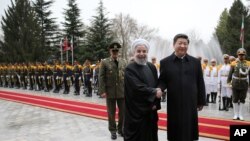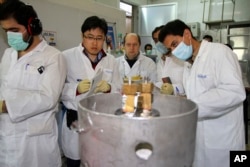Iran's Supreme Leader Ayatollah Ali Khamenei is calling for closer economic and security ties with China, saying Iran has "never trusted the West."
Khamenei told Chinese President Xi Jinping during a meeting Saturday that Tehran was seeking to expand ties with "more independent countries" like China.
Xi is the first head of state from the group of global powers that negotiated the historic nuclear deal with Iran to meet with Khamenei. The Chinese leader arrived in Iran late Friday on a tour of the Middle East.
Prior to meeting with Khamenei on Saturday, he met with Iranian President Hassan Rouhani at the president’s residence, where the two leaders oversaw the signing of 17 agreements aimed at expanding diplomatic and economic cooperation.
The two countries also agreed to boost mutual trade.
"Today, we discussed strategic relations between the two countries, regulating and signing a comprehensive 25-year document and also upgrading bilateral ties in the coming 10 years. We decided to increase mutual trade up to $600 billion,” Rouhani said.
Strategic partnership
Xi, who is making the first trip to Iran by a Chinese president in 14 years, said the two sides agreed to form a comprehensive strategic partnership.
"We decided to turn mutual relations into relations that would turn into strategic relations, and also issues that joined us. A statement on both sides should also take this opportunity in order to further upgrade mutual exchanges at different levels and further boost the political trust between the two countries,” Xi said.
China was a top consumer of Iranian oil even during the three years of international sanctions that targeted Iran’s nuclear program. Now that the sanctions are lifted and Iran is ramping up oil production, that relationship could grow further.
China played a key role in international efforts to roll back sanctions against Iran in exchange for Tehran scaling back its nuclear program.
Ahead of the visit, the U.S. said it hoped Beijing would continue to work with Washington to ensure Iran does not reconstitute its nuclear capabilities.
Nuclear issue
"We’re certainly not trying to stop [China’s] economic or diplomatic engagement with Iran. We would just hope that, just as China has played a very constructive role throughout this process, that China will continue to play that role in all of its engagement with the Iranian government,” said U.S. Ambassador Stephan Mull, lead coordinator for Iran nuclear implementation at the State Department.
The U.S. and China are co-chairing a working group to oversee the new design of Iran’s heavy-water reactor at Arak so that it will not produce weapons-grade plutonium.
“We expect strong cooperation to continue as we all work together to ensure Iran’s continued compliance with the [nuclear agreement],” Anna Richey-Allen, a spokeswoman from the State Department’s East Asia and Pacific Bureau, said Friday.
Joint Comprehensive Plan of Action
China is among the world powers that reached the agreement, the Joint Comprehensive Plan of Action (JCPOA), with Iran last July. In that nuclear pact, Tehran pledged to scale back its uranium-enriching activities and submit to inspection, in exchange for lifting sanctions.
In an op-ed article appearing in an Iranian newspaper and quoted by the Chinese Foreign Ministry, Xi said: “China appreciates Iran's assurance of not intending to develop nuclear weapons, supports Iran in upholding its legitimate rights and interests, and fully recognizes Iran's contribution to the conclusion of the Joint Comprehensive Plan of Action.”
China has been Iran’s biggest trading partner in the past six years, according to Xi. Bilateral trade in 2014 was around $52 billion, but dropped off last year because of falling oil prices, according to Iranian officials.
Seeking a new international order
But a key analyst says ties between the two counties go beyond economic benefits. Michael Singh of the Washington Institute for Near East Policy said both countries share the goal of “reshaping the international order in a way that excludes us more.”
Singh, who served as senior director of Middle East Affairs at the National Security Council from 2005 to 2008, testified before the U.S. Senate Foreign Relations Committee on Wednesday. He said that China “really sees Iran as its main strategic partner by virtue of its geographic location, by virtue of the fact that it's really the only major power in the region which isn't allied with the United States.”
Chinese Xi’s visit to Iran came after a stop in Saudi Arabia earlier in the week during that country's heightened tensions with Iran.
A State Department official told VOA the U.S. anticipates that “China will join us and others in encouraging all parties to avoid actions that escalate sectarian tensions in the region.”





